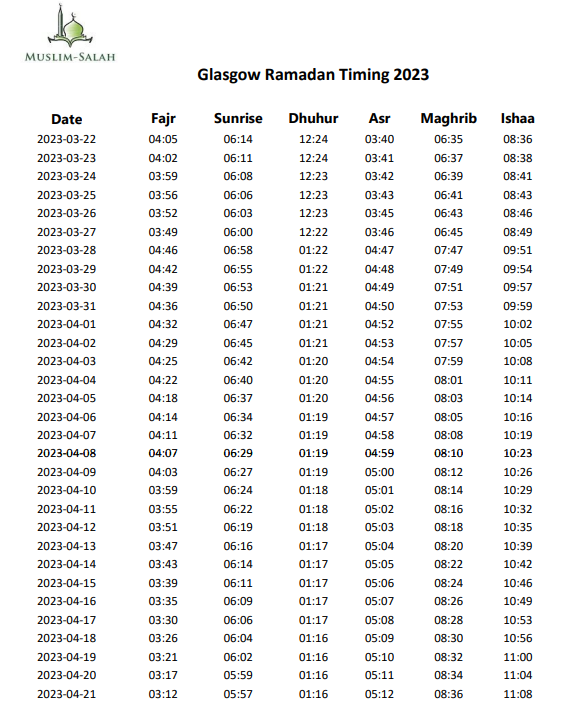Glasgow Ramadan Timetable 2023
Glasgow Ramadan Timetable 2023
Glasgow Ramadan Timetable 2023 provides you the latest information on Glasgow Sahur times and Glasgow iftar times. With the Glasgow Ramadan Timetable 2023 you can find out the prayer times on a daily basis.

Ramadan Timetable 2023 in Glasgow
Alhamdulillah! The blessed month of Ramadan is coming again with all its blessings. Muslim brothers and sisters around the world have been looking forward to this month to worship Almighty Allah and to experience the spirit of the blessed month of Ramadan.
What time is iftar in Glasgow today?
The holy month of Ramadan comes to bless the Islamic world with its spiritual beauties. In this blessed month, believers practice fasting.
„What time is Sahur in Glasgow? Our brothers and sisters who are curious about answers to questions like“ What time is Iftar in Glasgow? „, can download the Ramadan schedule on their computer or phone.
When is Ramadan 2023 in Glasgow?
Ramadan is approaching, the holy month of worship when Muslims gather at iftar tables and homes are filled with peace and prosperity. This year, Ramadan 2023 begins on March 22, 2023 and ends on April 21, 2023
- First Day of Ramadan: Wednesday, March 22
- Last Day of Ramadan: Friday, April 21
- Eid al-Fitr Day 1: Saturday, April 22
- Eid al-Fitr Day 2: Sunday, April 23
- Eid al-Fitr Day 3: Monday, April 24
The month of Ramadan
„The month of Ramadan is when the Quran was sent down as guidance for people and as clear proof of guidance and discernment. So whoever of you is in the presence of the month, let him fast in it. And whoever is sick or on a journey, let him fast a number of other days – God wants to make it easy for you, He does not want to make it difficult for you.“ (Sure 2, 185)
From this verse, the majority of Islamic scholars derive the provision that every sane and sexually mature Muslim is obliged to fast throughout the month of Ramadan. Exempted from this obligation are the sick, travelers, and people who are unable to fast due to special physical circumstances such as pregnancy, menstruation, and old age.
In addition, it is said that Ramadan is one of the names of God and thus designates the „month of God.
The peculiarity of Ramadan compared to other months is mainly that in it, more precisely in the „Night of Destiny“ (lailat al-qadr), a part of the Koran was sent down for the first time. This night is hidden in the last ten days of Ramadan. According to the Koran, it is more valuable than a thousand months (Sura 97: verse 3). Muslims therefore look for this blessed night in the last ten days to spend it more in prayer, remembrance of Allah and meditation.
Dua for Breaking Fast
أفطر عندكم الصائمون ، وأكل طعامكم الأبرار ، وصلت عليكم الملائكة
Aftara indakum as-saa’imoon, wa akala ta’aamakum al-abraar, wa sallat alaikum al-malaa’ikah
May the fasting people break fast at your place, and may the pious eat from your food, and may the angels pray for you
